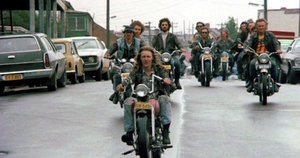
The first Australian road movies are a unique collection of films that presented a pessimistic, verging on dystopic, vision of contemporary society. Produced within the 1970s cinematic revival, these films dared to confront issues of immediate significance, rather than eulogising Australia’s past. In essence, these ‘road trips’ were allegories for where the nation was heading.
The FJ Holden (1977) and Summer City (1977) are brutally honest portrayals of youth culture, suburbia, alcoholism, teen sex and misogyny. For the films’ characters, the car is the ultimate symbol of freedom and mobility, yet ironically they are effectively trapped within the banality of the suburban sprawl. Only in the genuinely progressive Oz: A Rock and Roll Road Film (1976), is a female character provided the chance to escape her ‘duties’ in the house to embark on her own road trip.
The hypnotic bikie film Stone (1974) captures both the spirit and menace of early Australian bikie gangs, many of which consisted of Vietnam veterans, disillusioned by their homecoming treatment. Phil Noyce’s short feature Backroads (1977) provided a vehicle for young black-power activist Gary Foley, and graphically depicts the alcohol, poverty and barbed wire that dominates the Aboriginal characters’ lives. The chilling Long Weekend (1978) offers an environmental angle, depicting a malevolent city couple wreaking havoc on the natural landscape as they use their four-wheel-drive to go camping, and killing any living thing in their path.
The Cars That Ate Paris (1974) and Mad Max (1979) use graphic and emotive symbolism to comment on the alarmingly high road toll in the early 1970s. In Paris, a Volkswagen Beetle has been modified to include huge protruding spikes that impale unlucky Parisian townspeople. The symbolism is clear – the car is a weapon. In Mad Max the exhilarating head-on collisions capture the fear and terror associated with the carnage on the Australian roads.











